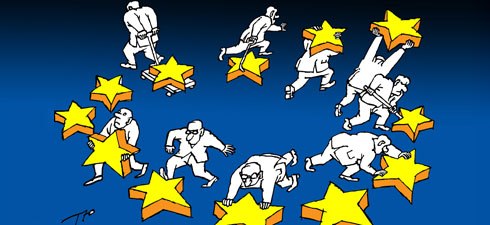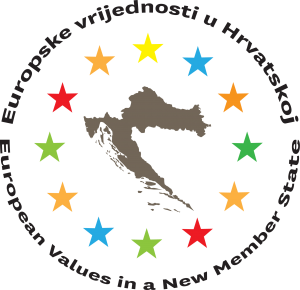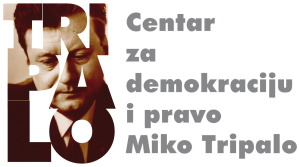On Thursday, 28 May 2020, Center for Democracy and Law Miko Tripalo, in cooperation with the Faculty of Philosophy of the University of Zagreb, organized the online guest lecture Populism and Illiberal Tendencies in Croatia and the EU. This event was organized as part of Centre Miko Tripalo’s Jean Monnet Project European Values in a New Member State: Five Years of Croatian Membership in the EU. The original lecturer was meant to be Josip Kregar, member of Centre Miko Tripalo and of the project team and professor of sociology at the Faculty of Law. However, prof. Kregar had fallen unexpectedly ill and subsequently, regrettably passed away in August. Dario Čepo, the project Academic Coordinator took over at the last minute as the lecturer for this event. The online lecture was moderated and hosted by Izvor Rukavina, professor at the Department of Sociology of the Faculty of Philosophy. The lecture was attended by 26 students. It was the third of the four planned guest lectures outlined in the Jean Monnet project’s work plan, and the second conducted online due to the Covid-19 lockdown in Croatia in effect since mid-March and the accompanying epidemiological measures preventing in-person events.
At the beginning of the online lecture, Izvor Rukavina greeted Dario Čepo and the representatives of Centre Miko Tripalo. He then briefly introduced the Centre, its Jean Monnet project as the framework for this lecture and the lecturer Dario Čepo, as well as the topic of populism. Dario Čepo then began the lecture by defining the term populism and outlining its main characteristics. He started by asking fundamental questions, such as what is populism, is it harmful to society and if so, why. Čepo defined populism as an ideology that is founded on two main postulates. The first is that society is divided into two separate groups: the people and the elites. The people is considered to always be honest, genuine and in pursuit of a basically simple goal – to live a better life. The elites, on the other hand, are corrupt and morally compromised. The second basic premise of populism is that politics and political decisions have to be derived from the will of the people and that the people are always right.
Čepo then asked the next question that derives from this definition of populism: who are the people. The people according to populist are a monolithic community of like-minded persons with a common identity, thus placing all those with different identities “outside of the people”, labeling them as the other and even as the enemy. Populism puts absolute power into the hand of this “people”, focusing on the will of the majority as the only legitimate underpinning of politics through tools such as referenda. Populists, according to Čepo, stress the legitimacy of letting the people decide, thus denying the right of institutions to limit this power. This idea, of course, is contrary to the principles of liberal democracy, more specifically the liberal part of it which posits that the will of the majority should be restricted when it threatens minority rights. Liberal democracies have developed frameworks and mechanisms to protect the minority from the majority and to prevent the tyranny of the majority. Čepo then poses the next natural question: how can societies reconcile the opposing ideas of majority rule and protecting minorities.
The populist answer to this question, according to Čepo, is that minorities are not the problem, but rather the elites. The elites are corrupt and in the hands of special interests, working for their benefit and against the people. The definitions of the elites are quite vague but come down to three different groups: all politicians are the same, traditional media and their allies and intellectuals and educated experts. Čepo notes that there are basically three different types of populism in Europe as demonstrated by the different political options: strong right-wing populism, somewhat weaker left-wing populism and the very rare centrist populism.
Left-wing populism in Europe is weaker than the right-wing one, especially when a longer historical context is taken into account. It relies on the key concepts of economic and social justice and equality, while the populist elements focus on the people as the underprivileged and precarious worker class. Left-wing populists frame their actions less in the context of belonging to a nation-state and more in the belonging to a socio-economic group. Čepo spoke about different examples from European countries, such as Syriza, Podemos and the British Labour Party under Jeremy Corbyn.
Centrist populists are much rarer in Europe and tend to be less steeped in ideology. Their platforms mostly focus on reforming and taking over existing institutions, while the us-versus-them debate is focused on current versus future politicians. Centrist populists label current politicians as the corrupt elites while they offer a better, future leadership that is more representative of the people. Right-wing populism is currently the strongest one, both in Europe and in Croatia. Čepo notes that at the heart of right-wing populism is the dichotomy between the people and the elites set to destroy the “people’s” way of life.
In Croatia the focus of populists is on anti-minority, anti-intellectual and anti-system actions and rhetoric. The actions aimed at restricting minority rights are mostly directed towards national minorities, LGBTQ rights and migrants thorough initiatives such as changing the Constitutional definition of marriage, changing Constitutional Law to restrict minority representation and stoking anti-migrant sentiment. The anti-intellectual tendencies are rarer and mostly focus on anti-vaccination rhetoric and general disparagement of “expert” input into public debate and policy. Finally, the anti-system populist leanings tend to criticize democratic systems and have a higher tolerance for autocratic regimes. In Croatia these are demonstrated in low levels of trust in institutions, especially parliament and media, while having comparatively higher trust in the military and the police. These low-levels of trust combined with institutions eroded by corruption and ineffectiveness are a fertile ground for populism.
The student questions and the discussions focused on the “In the Name of the Family” movement representing right-wing populism in the non-governmental sector and how their campaigns coalesced around issues of family and education. The role of social media in these campaigns was highlighted by some students. The example of the Workers’ Front, an arguably left-wing populist party was discussed. Čepo highlighted another difference between left and right populists – the left’s attack against elites focus on those in power, while those on the right often attack minorities and the marginalized, who they portray as holding some secretive power with which they covertly rule and subvert “our” society. The role of third options and protest votes in the rise of populism in Croatia was also discussed, especially in view of the upcoming parliamentary elections in July.
Europske vrijednosti u novoj državi članici: Hrvatska u prvih pet godina članstva u EU
European Values in a New Member State: Croatia in the First Five Years of EU Membership



